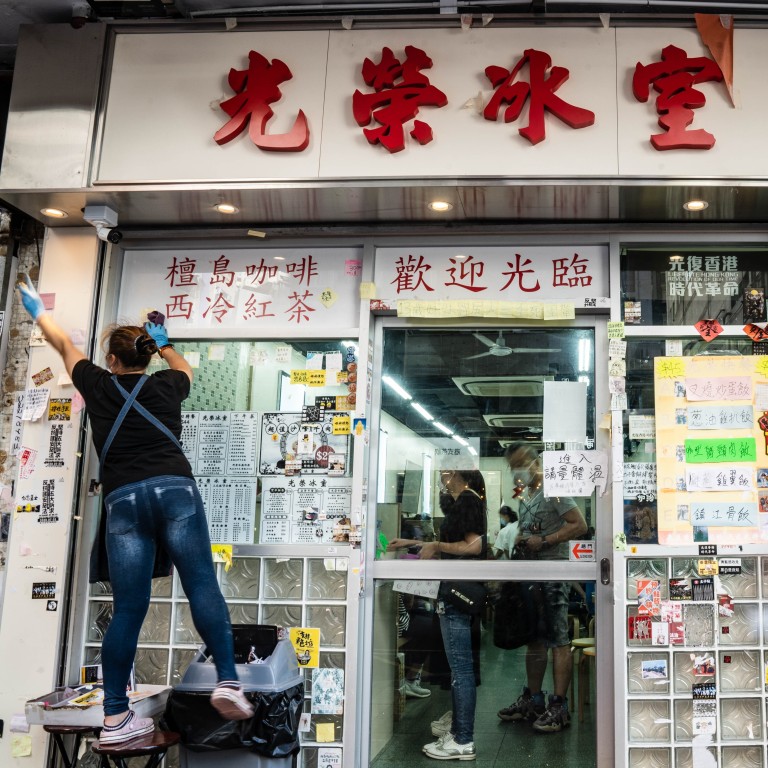
‘Yellow economic circle’ takes a hit as protest-friendly shops in Hong Kong back off amid uncertainty over national security law
- Looming legislation by Beijing sparks fear over shop posters and even social media remarks made by restaurant owners
- Term was coined to refer to shops supporting anti-government movement triggered last year by the now-withdrawn extradition bill
Some protest-friendly businesses dubbed “yellow shops” in Hong Kong have backed off from openly supporting the movement after the shock departure of a leading advocate in the face of the looming national security law drafted by Beijing.
The action came as opposition supporter and restaurant owner Cheung Chun-kit, 41, who runs the Lung Mun Cafe chain, announced on Facebook on Tuesday that he was quitting the “yellow economic circle”.
The term refers to operators who openly support the anti-government movement, sparked last June by the now-withdrawn extradition bill, and patrons with similar political stances choosing their services.

Supporters of such shops, who are called “yellow ribbons”, advocate spending money at these stores, and shunning those that do not support protesters. Businesses known to back the establishment or police are deemed “blue”.
Cheung said in his social media post: “This is a decision after careful thought and consideration. Lung Mun Cafe announces its withdrawal from the yellow economic circle,” adding that he had gone through a lot with Hongkongers over the past year, including personal attacks from “blue” shop owners and even other “yellow” operators.
He said Beijing’s national security law, to be gazetted by the Hong Kong government on Tuesday night, had prompted the decision.
Not the Michelin guide: restaurants branded ‘yellow’ if they support protests, ‘blue’ if they don’t
Cheung pledged he would continue to speak out against social injustices and resort to other means of serving Hongkongers.
Speaking to the Post, Cheung said he faced tremendous pressure as he was recently followed by strangers, and told by others that people were plotting to harass his family.
“I’ve also been smeared with unfounded allegations such as money laundering. In the face of the national security law, I don’t want my political stance to implicate my staff. We are talking about 200 of them. After careful consideration I’ve decided to quit [the circle],” he said.

06:22
Hong Kong restaurants accused of using coronavirus crisis to refuse service to mainland Chinese
Cheung said he had removed promotional leaflets supporting protesters and from now on would refrain from labelling his eateries as “yellow”.
“But I will continue to voice support for the movement in my personal capacity. I will also keep on providing free vocational training classes for youngsters,” he said.
Many yellow shops are worried that their propaganda posters will land them in trouble, such as being implicated for inciting subversion of the state
Gordon Lam Sui-wa, convenor of the Hong Kong Small and Middle Restaurant Federation, which supports the so-called yellow economy, said the national security law had created a chilling effect on the city’s businesses.
“Many yellow shops are worried that their propaganda posters will land them in trouble, such as being implicated for inciting subversion of the state. That’s why some shops have cleared out their material to avoid being accused of violating the law,” he said.
Lam, who also runs restaurants, said he was unfazed as he had not put up any protest leaflets at his establishments. “I’ve always made my stance clear but I’ve never put up material,” he said.
What happens to the economy when businesses are split by protests into ‘blue’ vs ‘yellow’?
Ben Liu Chun-ho, 46, owner of Ma Ma’s Dumpling, a “yellow” shop in Yuen Long, said he was not bothered about the security law but he had also taken preventive measures to avoid trouble.
“I’ve removed some propaganda containing sensitive meaning. For the other materials, I just leave them. I will continue to support the yellow economy,” he said.
I don’t know whether I will get into trouble for a picture or critical comments I post
With no details of the law announced as yet, some other business owners supporting protesters have said they will pay extra attention to messages they put out in public.
In Mong Kok, a cleaner was seen tearing down protest banners at a shopfront.
Miko Man, 32, an owner of herbal shop Y & T Chinese Medicine Herbal Tea Company, said she would take down past messages on social media that were critical of the government.

“I will delete them after work tonight just in case, because I don’t know whether I will get into trouble for a picture or critical comments I post. There is no guideline at all on what we can say, and what we can’t,” she said. “I won’t be so critical in public speech after the law is put in place.”
She added that she used to slam Chief Executive Carrie Lam Cheng Yuet-ngor and police officers with foul language on Facebook.
Man said she felt uneasy and disturbed to see social media gripped with fear, and disappointed at the prospect of seeing the yellow economic circle movement challenged.
“But I will proceed with the movement,” she said.
Tiger Lau Wai, a 35-year-old boss of cleaning company Help U Clean, said he would remain a supporter of the movement, but with caution.
“I don’t think I will get into trouble by saying ‘Hong Kong add oil’,” he said, referring to the Cantonese phrase of encouragement. “I will make sure there are no anti-China messages.”


